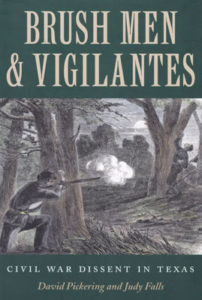
Among the accounts of Civil War-era violence in this book are several that take place in Northeast Texas.
Last week I wrote about an event that occurred in northeast Hunt County in 1844, prior to the creation of Hunt County. After several thefts and at least three murders, settlers in the vicinity took the law into their own hands, formed posses who arrested eight men, and set up a mock court system. All eight were charged with theft; four were charged with murder. The so-called jury found the four guilty of murder and sentenced them to hang. The four not involved with murder were forced to leave Texas after putting nooses around the necks of the murderers and witnessing their compadres hang.
Today we skip ahead almost twenty years to 1862-1863, in the throes of the Civil War. Before Texas left the Union a vote was taken in all counties to determine whether to secede or remain in the Union. The vote in Hunt County was incredibly close, 51% voted to secede while 49% wanted to remain. It created an extremely volatile environment that would continue until 1874 or later. Lack of trust and violence once again led to vigilante justice. Here are some of the stories Judy Fall and the late David Pickering captured in their book Brush Men & Vigilantes: Civil War Dissent in Texas (Texas A&M Press, 2000).
Falls and Pickering relied on early newspapers, oral histories gathered by Judge L.L. Bowman in the 1920s and 30s, along with few legal documents created at the time. Dates and names may be slightly erroneous, but the gist is true.
In 1861 attorney Martin D. Hart of Greenville raised a company of men known as the Greenville Guards. At the top of the roster, Hart wrote, “We are willing to serve on the Confederate side if our home county is invaded, but not otherwise.” Clearly, Hart and his men were part of the 49% of Union supporters in the county.
In the summer of 1862, Hart and thirty-seven others made their way to Missouri where they volunteered in the Union Army. Hart then sent about twenty men back to Hunt County to recruit Unionists. They arrived here in late January, shortly after Captain Hart and his lieutenant, a man from Illinois named Hayes were captured and hanged at Fort Smith by Confederate troops.
News quickly spread in Hunt County and before 1863 was over, at least nine men associated with Hart were captured and executed by vigilantes, or Brushmen.
The first to die were Parson Austin H. Glenn, a Methodist Protestant (Northern) preacher and a man known only as Trace Chain Smith. Glenn lived near Prairie Valley, between Lone Oak and Campbell where arms captured in Arkansas were hidden. Taken by bushwhackers, the two men were held in a barn until a mob overpowered the guards and hanged them on the banks of Cowleech Creek.
Parson Glenn aided the injured Horace DeArman who slipped away and joined four other Hart followers in Jernigan Thicket near Commerce. There they joined several others in hiding. When food stores became desperate, DeArman and three others agreed to surrender. After much negotiation, the four came out of the thicket believing they would be taken to Greenville for a legitimate trial. Instead, the negotiators escorted them to Sulphur Springs, the home of the radical Knights of the Golden Circle, a pro-Confederate group. Colonel Earley (Early) from Fannin County led the prosecution “charging the men with treason and complicity with a company of murderers and robbers.” All four were hanged near White Oak Creek in present day Sulphur Springs. The remaining men managed to escape that time, but many were later caught and hanged.
